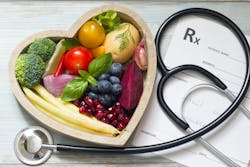An analysis of a food-as-medicine program that provides home-delivered medical prescriptions of healthy food to people in Stockton, Calif., to help address diabetes showed clinically important benefits for people with diabetes.
The real-world study, which was conducted and published by the Public Health Institute's Center for Wellness and Nutrition (PHI CWN) in a community clinic over a 12-month period, found that Healthy Food Rx participants had lower A1C levels, improved diabetes self-management, and improved overall diet quality and food security.
In 2021, Abbott and its foundation the Abbott Fund launched the Healthy Food Rx program in Stockton, Calif., where 60 percent of the population has diabetes or pre-diabetes. The program brings together Stockton-based organizations to help individuals living with diabetes by delivering free recipe-based food boxes to approximately 450 participants' homes and providing hands-on education about managing their diabetes through nutrition. PHI CWN's study showed the following results after 12 months:
• Decreased A1C levels: During this study, participants with uncontrolled diabetes (baseline A1C values greater than 7.0%) saw their A1C levels decrease by 0.80 percent, on average (from 9.73 percent to 8.93 percent, p = 0.003). This average decrease for the group exceeds the widely accepted 0.5 percent benchmark that is considered a clinically significant change and is associated with improved health outcomes in people with diabetes, the researchers said.
• Improved diabetes self-management: The number of participants who rated their ability to self-manage their diabetes grew significantly through the program (p < 0.05): 88 percent of participants reported they follow their meal plan (compared to 58 percent before enrolling in Healthy Food Rx); 78 percent reported more physical activity (compared to 61 percent); and 43 percent now talk with mentors and friends about diabetes management and healthy living (compared to 12 percent), all consistent with empowerment of people living with diabetes.
Improved diet quality: Participants' average fruit and vegetable consumption increased significantly. Fruit intake increased by 0.28 times per day, which equals almost two more servings per week; and vegetable intake increased by 0.14 times per day, which equals one more serving per week (p = 0.001 and 0.028, respectively).
• Improved food security: At the start of the program, 34 percent of participants were food-secure. During the program, food security increased significantly to 44 percent (p = 0.018).
Healthy Food Rx is one of the largest food-as-medicine programs for people with diabetes in the country, having reached more than 450 participants to date. Based on initial results, Abbott and the Abbott Fund are working with partners to expand the program, targeting an additional 1,000 people by the end of the year.
Community Medical Centers (CMC), a local federally qualified health center in Stockton, identified potential Healthy Food Rx participants. Program participants received food boxes from the Emergency Food Bank Stockton/San Joaquin (EFB), delivered directly to their home every other week for one year. The boxes included ingredients for a family-sized healthy meal with vegetables and fruits, as well as pantry staples such as beans, rice and nuts. The box also contained a recipe card and link to an optional online cooking class with EFB, which provided additional guidance and diabetes education.
"This recent study shows the powerful impact Healthy Food Rx has had on community health and well-being," said Christine Noguera, CEO of Community Medical Centers, in a statement. "Community health centers like CMC have always worked with patients to manage chronic conditions like diabetes. Abbott's initiative combining regular access to healthy food with primary care and health education has made all the difference for people living with diabetes. We were proud to participate in this important research."
"Chronic conditions like diabetes are growing, especially in low-income Black, Latino and Native American communities where it can be difficult to access foods that are affordable, healthy and culturally familiar," said PHI President and CEO Mary Pittman, Dr.P.H., in a statement. "The positive results of Healthy Food Rx show that we can build systemic supports that help people eat well, live healthier lives and thrive."


